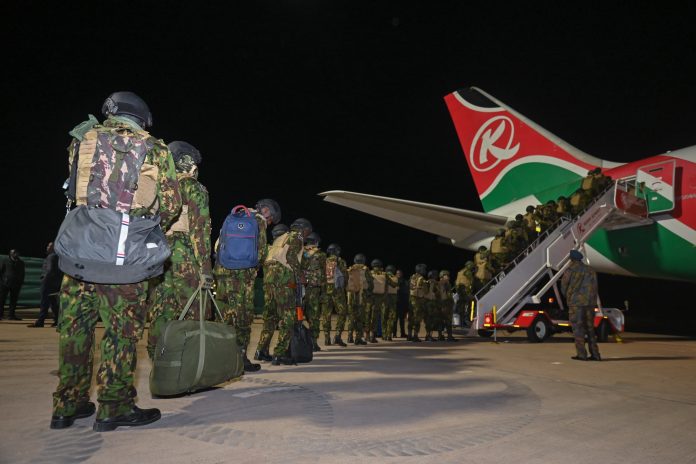On Thursday 6th February at 1 am, the government dispatched 168 more soldiers, from the Paramilitary General Service Unit to Haiti to help fight against the criminal gangs that are rampant in the country.
After months of training, the soldiers were seen off from the Jomo Kenyatta International Airport by top government officials and are expected to arrive at Port-au-Prince on Thursday evening.
The number of Kenyan soldiers in Haiti under the Multinational Security Support Mission (MSS) has now risen to 800. The Kenyan government has put on a brave face amidst US President Trump freezing more than Sh. 1.7 million for the Haiti mission led by Kenyan cops.
Kenyan officials, who were also taken aback by the news from Washington DC, noted that the MSS Mission still had a lot of money to sustain operations in the war-torn nation until September.
“We have extended our contracts to October this year and we believe there will be a solution to this issue by then,” said one confidential source.
Reportedly, the US government recently delivered heavy war machinery and equipment to the MSS mission in Port-au-Prince. The American embassy in Haiti noted that the mission was still ongoing despite President Trump’s orders.
“The United States has not paused all assistance for the Multinational Security Support mission in Haiti. On the contrary, Secretary Rubio approved waivers to allow for millions of dollars in mission-critical assistance to the MSS mission and Haitian National Police (HNP),” read a statement issued by the embassy.
“The Department of State approved waivers for $40.7 million in foreign assistance to benefit the HNP and MSS mission. This includes logistical contracts to support forward operating bases, a vehicle maintenance contract to support the MSS mission fleet, a medical services contract for the HNP, transportation services for Department of State-provided equipment deliveries, and contracts that support subject matter experts with the HNP,” the statement continued.
On Wednesday, Kenya clarified that its operations in Haiti will not be affected by the U.S. government’s decision to freeze financial contributions to the UN’s fund. The mission is not a UN-led operation but instead relies on voluntary contributions.
Foreign Affairs PS Korir Singoei noted that the UN Trust Fund for Haiti supports the MSS mission as outlined by the United Nations Security Council Resolution 2699. Currently, the fund contains $15 million, with the US also directly contributing $300 million in funds and equipment.
At the end of 2024, countries such as the USA, Canada, France, Turkey, Spain, Italy, and Algeria had pledged a total of $110.3 million. Around $85 million had been received, with the larger chunk coming from the US.
Despite the pause in foreign aid, officials insist that the cumulative funds have enough money to run until September 2025.
The Kenyan contingent in Haiti is part of an UN-approved international force made up of around 2500 officers from various countries such as Jamaica, Guatemala, El Salvador, Bahamas and Belize.










